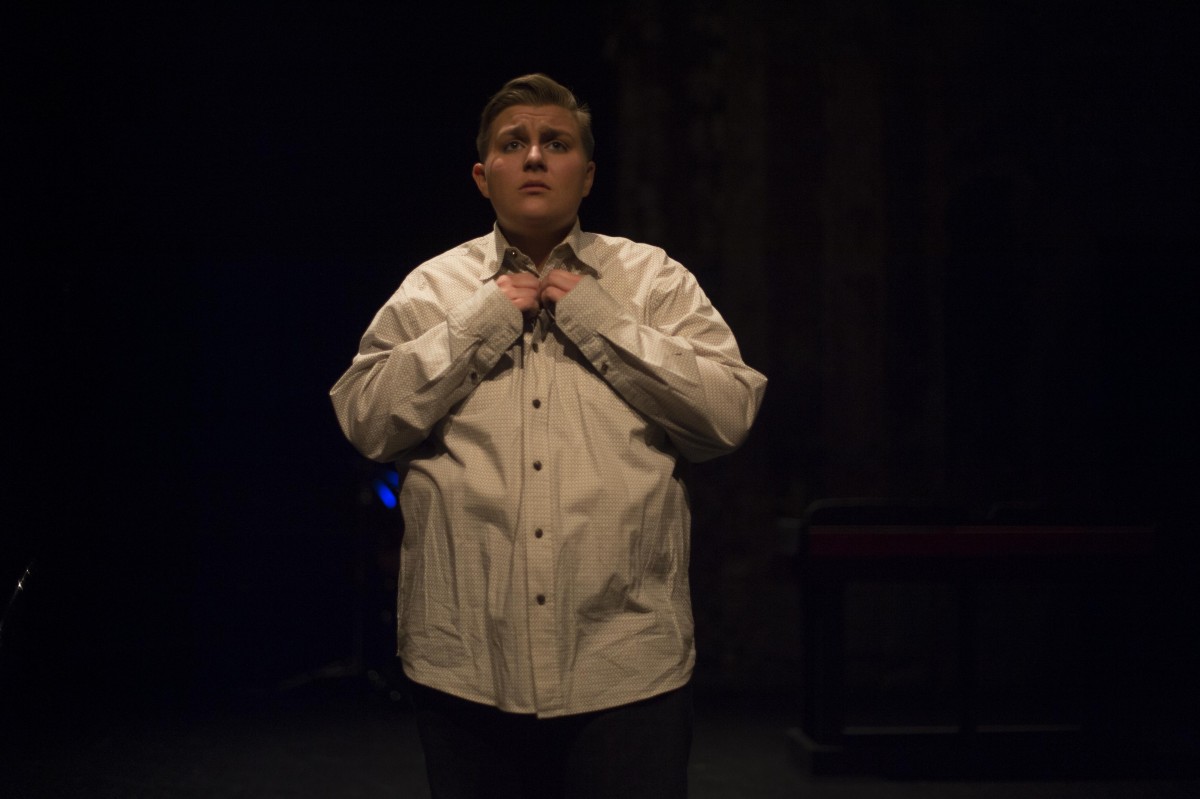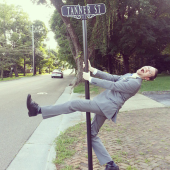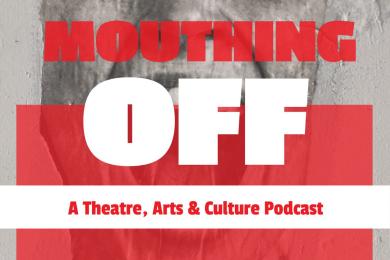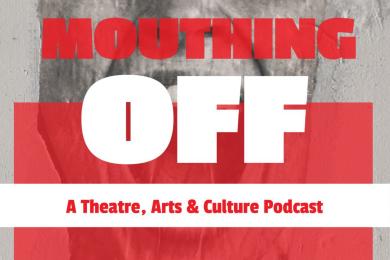A Body of Work
On a Saturday morning, a dozen teenagers mill around a dimly lit corner of a middle school in the suburb of Crystal. Occasional bursts of giggles and melodramatic outrage cut through the din of pubescent chatter. Even those who manage to stand still can’t quite figure out how to hold their bodies, contorting with stiff uncertainty and self-consciousness. It’s a circus of raw enthusiasm and adolescent anxiety, and at the center of it all is their ringleader, a clown named Allison Witham.
Witham, who is twenty-nine, wears a t-shirt tucked into baggy, loose-fitting blue jeans, and like the students around her, she’s barefoot. The group is a devised theater-making class Witham is teaching in the Teen Conservatory Program of Stages Theatre Company. At the moment they’re building a scene set in a bank using only their fidgety, gangly bodies. Witham scans the room, visualizing who will be who—or more likely, who will be what.
“Ok, so you,” she points to one of the taller girls. “You’re going to be the other half of the teller’s desk.” The student joins another girl already in position. The pair now face each other on their knees, heads bowed, and arms held straight in front of them, parallel to the floor. The tips of their fingers barely touch, forming a countertop desk that can flip up to make a walkway.
With the desk in place, Witham directs her attention to another student, one of the younger girls playing the teller. “So now, this is your desk, and maybe it has a drawer here that you can open,” she mimes opening a drawer complete with a squeak sound effect. “But when the printing press guy comes in, you let him in by lifting up this half of the desk.” Witham takes the outstretched arms of one of the desk girls and lifts it open, as though her arms are hinged on her shoulders. “Got it?” The teller nods, and Witham moves on to make the other parts of the bank.
This style of performance—with all set pieces, scenery, sound effects, and props mimed or made using only the bodies of the performers—is very similar to the professional work Witham does as a founding and core ensemble member of Transatlantic Love Affair. Each actor takes on multiple roles in each production and never leaves the stage during the performance. Since Transatlantic debuted in 2010, the group has gained a significant following and racked up an impressive number of accolades: an Ivey Award in 2012, declared Best Theater Troupe by City Pages in 2016, and a number of audience choice awards for their productions in the Minnesota Fringe Festival.
Witham is the only person in the company, including its artistic director, who has been involved in every single production. An incomplete list of the roles she’s played include a gossipy old woman, a wise bartender, a walrus, a caring mother, a Prohibition-era gangster, a small town boy with a limp, a horny old woman, an intensive care nurse, a lecherous factory owner, a desperate farmer, a dynamite salesman, and a pig (twice). And those are just the animate beings. An even longer list also includes a bell tower, a rocking chair, a chest, a tree, countless doors, long stalks of prairie grass blowing in the breeze, and so on.
While all Transatlantic ensemble members are called on to play a wide variety of roles (and things), Witham in particular has shown an exceptional ability to move fluidly across spectrums of gender, age, and social class. As a physical-based performer, she has an extreme awareness of and facility with her primary instrument: her body.
At the same time, her body defies the conventions of professional theatre. Female actors face the same narrow expectations over the shape, size, and presentation of their bodies that all women face, only amplified. The bodies of women seen onstage are often disproportionately tall, thin, and feminine compared to the myriad of body types in the real world.
Witham describes herself as having “a long torso with a belly and short legs.” While she identifies as female, her look reads as more androgynous. She doesn’t wear makeup or nail polish. Her dark blond hair is cut short and parted neatly to the side. When she smiles, her blue eyes light up and a dimple appears on her left cheek, giving her the look of an earnest, but potentially mischievous boy scout. She wears men’s clothes and with the exception of a few college roles, hasn’t worn a dress since high school prom.
Since graduating from college in 2010, Witham has had consistent work as a professional actor, not just with Transatlantic, but with other companies as well. Her success is all the more notable given her radical defiance of gender norms. The shape and presentation of her body could’ve made her acting career a non-starter, but instead of accepting her physicality as a liability, she’s turned it into her strongest asset.
"Eyes Wide Open"
The beginning of Witham’s relationship with her own body was a rocky one. “The first twelve months were very difficult,” says her mother, Maria Suenkel. Witham was fussy and impatient, but that changed soon after she turned one year old and started to walk. “From then on, she never looked back,” Suenkel says. “She was the happiest, most contented child ever. No more crying. No more tears. Freedom. Independence. She had her legs.”
Witham grew up in Elmhurst, Illinois, a wealthy suburb twenty miles west of Chicago. Her father, Dan Witham, is from Elmhurst originally, but her mother grew up in Louisville, Kentucky. Eighteen months after the two met, they were married, and by their first wedding anniversary, Allison was born.
“She was so different from the very beginning,” Suenkel says. “The only time she was happy was when her feet could touch the ground.” Even on excursions around the neighborhood in her stroller, when most babies would be lulled into a nap, Witham insisted on being upright and taking in the world around her. “She never wanted to take a nap. She was always interested. Eyes wide open.”
Suenkel channelled Witham’s energy into activities: sports, music, dance, and any other offering that presented itself. From infancy, Witham was most drawn to stories. Her crib was full of books. “When I woke up, I knew the drill was to read books until my mom came to get me,” Witham says. On Saturday mornings, she sat in a kid-sized fuzzy armchair, sippy cup in hand, watching cartoons. She connected with her father by watching movies. “She would sit on his lap, and he would tell her about the characters and the story,” Suenkel says.
Through 8th grade, Witham attended a private Catholic school. She was precocious and excelled in class. “Allison always loved, loved, loved school. This was a kid that never wanted a sick day, never wanted to stay home from school ever,” Suenkel says.
“I was for sure a goody-goody,” Witham says. “I won the Christian Spirit Award an embarrassing amount of times.”
When Witham was eleven years old, her parents divorced. Wanting a fresh start, Witham’s mother claimed nothing from the divorce, declared bankruptcy, and started working nights. Suenkel eventually took a job as an operating room nurse that required a move to Johnsburg, a small town forty-five miles away in northern Illinois, close to the Wisconsin border.
Even though Witham’s father was less actively involved as a parent, Allison wanted to stay in Elmhurst with him so she could attend York, the town’s public high school, which was nationally recognized for its offerings. Witham was supportive of the divorce, but saw a therapist at her mother’s behest. “I told the therapist, 'Look, between you and me, this is the greatest thing that ever happened,” Witham says, “You need to tell [my mom] that she did a-ok, and also, let me stay at York.’”
The therapist acquiesced, and Witham stayed in Elmhurst. For awhile, Suenkel made trips back and forth almost daily to help care for Witham and shuttle her between school, activities, practices, and home. The new arrangement quickly pushed Witham into a life of independence and responsibility many of her peers wouldn’t experience until college or even their mid-20s.
Witham continued to get involved in more and more school activities, including an eventual stint as president of the juggling club. In middle school and early high school, she had dabbled in speech. “I didn't do well at all until I started doing improv and impromptu speech,” she says. “As soon as the pressure of memorizing was off my shoulders, I did great.”
She followed her friends from the speech team to full theater productions, eventually being cast as a player in Rosencrantz and Guildenstern Are Dead, Tom Stoppard’s take on the minor characters from Hamlet. In what would be Witham’s first experience in experimental theatre, the director infused the play with Pink Floyd’s Dark Side of the Moon and had the audience sit on the stage with the performers. Witham was a traveling player, a non-speaking role, but she did get to use her juggling skills. The players also did rep performances of Stoppard’s 15-minute Hamlet. Without knowing it, this was Witham’s first taste of clowning “and being allowed to be really stupid and funny on stage.”
Getting a laugh was new, and Witham was hooked immediately: “I don't do drugs, so I don't have a ton of merit to say this, but of the drugs I've done, there's no high like getting a big laugh on stage.” She loved connecting with the audience and learning how she could make them laugh.
As early as the ninth grade, Witham knew she wanted to study English in college and go on to teach the subject at the high school level. The more she became involved in theatre, she decided to add that as an additional major. Lured by a generous scholarship offer, she decided to attend the University of Minnesota without even visiting the campus. What could’ve been a haphazard decision ultimately proved to be a fortuitous one, because Witham found a program with a strong basis in devised work with instructors trained in clown and physical performance. These experiences would provide Witham with a foundation on which she could build her professional career outside the conventions of traditional theatre.
"Dead in the Water"
In her first year at the U, Witham took a class called Creating the Performance, which challenged students to create performances collaboratively without a script. “We made something every two weeks or so,” Witham says. “Make something with a found piece of text. Make an installation piece. Take a text you really love and then direct it. It was starting to think like a director, like a theater-maker, rather than just an actor. And I was really into that.”
Lisa Channer, who heads the BA performance track of the U’s theatre program, was Witham’s professor and to this day remains a mentor. Channer was impressed by Witham from the start. “She was so self-possessed and emotionally intelligent and mature,” Channer says. “She was right away a leader among her peers for that reason.” Her work onstage also stood out. “She was just one of those students that was willing to really risk and make decisions and choices that were challenging.”
When Witham arrived at the U, Channer remembers her having “a body that didn't know yet how to move itself fully” and “that wasn't accustomed to lots and lots of this super expressive improvisational clown and play.” But, “she totally worked her ass off how to figure out how to make that instrument work.” Witham was advised to explore clown as a performance style with Robert Rosen and physical work with Luverne Seifert. “It was super physical,” Witham remembers about her first class with Seifert. “We were doing push-ups and huge stretches and some calisthenic stuff. In that class, you really come at it from the body. … I learned about grounding myself, finding my center of gravity, leading from different parts of the body, which was really rewarding.”
At first, Witham had trouble connecting with her physicality. “It's really hard when you start doing this,” she says. “You're really self-conscious. You're eighteen or nineteen years old, so when someone tells you, 'Stick your belly out as far as you can,’ in your head, you're like, 'Well, society has said to never do that, so….’” But Witham had always had an innate comfort in her own skin, and her work in clown only increased it.
Working in clown fed Witham’s desire to connect with audiences and make them laugh, while also giving her a release from the diligent and responsible work ethic she applied to her studies. It’s a balance she enjoys today, working as a full-time high school teacher and as a professional actor in evenings and on weekends. Being a clown, she says, requires you to be in the moment. “If you have a plan, you're doing it wrong. If you're up there and think, ‘This will be funny,’ you're dead in the water.”
Witham’s start in professional theater world happened when she was still a student. As part of a January-term class, she took a clown workshop with Jon Ferguson, who in addition to teaching also runs his own company. Ferguson was immediately impressed with how “immensely physical and agile and fast” Witham was. “Right away I was like, 'Oh my God, that woman is funny, like naturally funny,’” he says.
He sent her a Facebook message asking if she’d be interesting in working in a holiday show he was developing. She agreed, and in working on that production, she met Isabel Nelson, who would go on to cast her in Ballad of the Pale Fisherman, the sad love story of a fisherman and a selkie (a seal that can shed its skin to become a woman on land). Nelson knew Witham could be physical and quick on her feet, but she especially wanted help adding moments of levity to what was a melancholy story. Among other ensemble roles, Witham was one in a trio of older women who trade village gossip while they mend fishing nets. Almost every time the three appeared onstage, laughter followed from the audience.
Ballad of the Pale Fisherman debuted at the Minnesota Fringe Festival in 2010, and its success with audiences provided the basis for a new company founded by Nelson and her husband, Diogo Lopes. With Nelson from Minnesota and Lopes from Portugal, they called it Transatlantic Love Affair, and Witham has been with the company ever since.
“She, actually.”
In spending time with Witham, it’s easy to sense how comfortable she is with herself. When she’s onstage, especially in the more stylized clown shows she does with Ferguson, she can be a ham, feeding off an audience’s energy with pratfalls and visual gags. While her humor offstage can certainly be bawdy, it’s much more low-key and dry.
This ease probably plays a part in her ability to defy gender norms in both her personal life and professional work, but Witham has trouble pinpointing where it comes from. “I don't think it's ever something I've been meta-cognitive of,” she says. “It’s just the way I dress.” She doesn’t think her choices have been based in a decision to fit or not fit in any particular gender, but more a matter of comfort and practicality. For example, she cut her hair short for the first time in college after it kept getting pulled when she played rugby.
“Allison always danced to the beat of her own drum,” says Suenkel, her mother. It’s not as though Witham was shielded from traditional presentations of gender. She watched Disney movies regularly, and always identified with the main protagonist, regardless of gender. And for Suenkel’s part, she describes herself “as girly girl as you can possibly get.” When Witham was four years old and in dance, she and her classmates were able to wear their costumes to their lessons. Suenkel laughs when she remembers watching them all lined up. “It was princess, princess, princess, Batman.”
Neither of Witham’s parents forced her to wear any clothes or play with any toys just because they were traditionally meant for girls. With a few minor exceptions, none of Witham’s classmates or friends teased her for dressing however she wanted to dress or acting however she wanted to act.
“Honestly, I think it was less me being who I wanted to be and more my mom allowing me to be who I wanted to be,” says Witham, who also describes her mother as being “her superhero.” It’s clear Witham’s relationship with her mother is close. When Witham was a teenager, Suenkel would have preferred spending time together at the mall, trying on clothes, but when Witham didn’t show any interest, they’d instead go to a candle shop and “start making up names for grotesque smelling candles.”
Her comfort with gender fluidity has been useful in Witham’s acting career. Hanging on the walls of her dining room are framed posters and playbills of almost every show she’s been in. When she takes a quick census of male and female roles, she says the breakdown is “about 50-50,” although she notes one as “female, but butch” and another as “female, but really butch.”
One of those “butch” roles was B, a bartender at a pre-Stonewall underground lesbian bar, in the 2016 production June from Savage Umbrella. (Full disclosure: my wife was also in this production, and I was a company member with Savage Umbrella until 2015, but I wasn’t involved in June.) In certain respects, B has been the role closest to Witham’s actual lifestyle, although she doesn’t use the term butch to describe herself and considers it “old-fashioned.” The role is also one of Witham’s most dramatic to date. In a climactic scene, the bar is raided, and while everyone is arrested, the characters presenting as masculine, including B, are also violently beaten.
But Witham’s range extends beyond gender. In the recent Transatlantic show 105 Proof, Witham played two male characters. One was Jimmy, the Prohibition-era mob boss, and the other was Henry, a small town pre-teen with a permanent limp. “[Those] two characters are so completely opposite,” says Lopes, who directed that piece. “One is so fragile and the other one will kill you. She played that so beautifully, and sometimes seamlessly from one to the other that I was like, 'Whoa. You are amazing.'” Because the company doesn’t overtly costume, this effect is all the more challenging and all the more impressive for how successful it is.
The way Witham describes how she approaches such changes is a micro-sized version of how she explains her acting work overall. It’s rooted in the corporeal and works from the outside to the inside. “It's a little bit of a domino,” she says, “First, it's the body, because that's the biggest brushstroke. Then it's the face, like it's ... a mask for each character. Then the voice, and then I feel like the inside happens.” The way Transatlantic develops shows also impacts the character work, in that almost every ensemble member helps shape each character and casting doesn’t occur until much later in the process. Lines, mannerisms, details, and so forth come from different people and are collected over the entire development process until a casting choice is made, and then each actor uses what the others contributed for their character.
In her seven years as a professional actor, most of Witham’s work has been with companies that make original work, either building roles for actors or producing plays with characters from under-represented backgrounds. In the past year, though, she’s started auditioning for other companies that produce more traditional plays. It led to one slightly awkward situation at a general audition when the facilitator introduced Witham to the room by saying, “Allison Witham. He is non-union,” Witham quickly clarified, “She, actually.” (For her part Witham didn’t take offense. “I just really hope [the facilitator] didn’t feel bad.”)
“I don't know if I could get away with playing an ingenue,” Witham says, “It'd be high camp, I'm pretty sure. But I don't think it's just the exterior stuff that goes into casting me. I wouldn’t cast me as Ophelia in Hamlet, because I’m too bullheaded. Let’s say I was sixty pounds lighter and had long hair and dressed in a dress. I'd still be me. I’d just be me in drag.”
Last year, Witham started a relationship with Leslie Vincent—also a female actor, but with a more traditional gender presentation—and this has given Witham further insight into the challenges many women face in professional theatre. “Leslie told me she went to an audition, and a woman was wearing a wig, because she was asked to come in as blond. To the audition! Like, what the fuck?”[1]
"You make it work."
The final meeting of Witham’s devising class for the Teen Conservatory Program at Stages includes an informal presentation for parents. When I arrive, Witham has her students running through their short play—the one that included the bank scene—before the audience is allowed to enter the auditorium. “Dude, you can feel the anxiety in the air right now,” she says to me with a grin. Even the quick speed-through doesn’t seem to calm the nerves of her students.
Their performance starts smoothly, a few moments of hesitation or tentativeness, but no major hiccups. The story follows a small town during the Great Depression. The main employer, the printing press, is bought by a greedy financier who plans to mechanize the plant’s operations, laying off most of its workers and devastating the town’s economy as a result.
About half-way through, during a scene transition, there is a collective lapse in what comes next, and the students inadvertently skip several scenes that include some key plot points. A ripple of wide-eyed panic spreads from face to face as they realize the error.
There’s a long pause, and Witham leans forward in her seat.
Finally, one of the students adlibs a line that gets them back on track. Witham quietly pumps her fist and says, “Yes!” The students go back to fill in some of the plot holes missed from the skipped scenes. The snafu muddles the flow of the performance a bit, but a viewer with fresh eyes wouldn’t know that much has gone astray.
Afterward, Witham walks up to her students. “Way to go, guys! You did it!” A few of the teens bring up how they messed up, but Witham won’t hear it. “Hey, you know what? You all stuck together and figured it out. That’s what happens in theatre. You make it work.”





